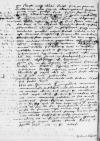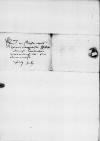 AAWO, AB, D. 6, f. 8r
AAWO, AB, D. 6, f. 8r
⌊⌋ manu Reverendissimae Dominationis Vestrae 24 Decembris scriptas ⌊Romae⌋ accepi 19 Martii,
quibus mihi toto hoc anno, quo ⌊Romae⌋ sum, nihil contigit gratius. Affirmare enim ausim nullum filium ardentius amare posse patrem suum quam amem, ut aequum est, Dominationem Vestram Reverendissimam. Numquam enim oblivisci beneficiorum in me collatorum in ⌊Brabantia⌋, ⌊Germania⌋ et istic in Sarmatia potero on the margin⌈poteropotero on the margin⌉. Vix credat Dominatio Vestra Reverendissima, quam gaudeam, quoties hic vel in mensa domini mei cardinalis vel aliis locis occasio datur honorifice de Vestra Dominatione Reverendissima loquendi. Desinat, quaeso, Dominatio Vestra Reverendissima sese excusare, quod non satis mea aut pro eruditione aut dignitate ([s]ic enim scribit Dominatio Vestra Reverendissima) on the margin⌈(s hidden by binding⌈[s]s hidden by binding⌉ic enim scribit Dominatio Vestra Reverendissima)([s]ic enim scribit Dominatio Vestra Reverendissima) on the margin⌉ ob tenuitatem fortunae exceptus sim superinscribed⌈exceptus simexceptus sim superinscribed⌉; sciam ego me supra quam fortuna tum patiebatur {me} liberaliter a Dominatione Vestra Reverendissima fuisse tractatum. Haec ergo utrimque missa faciamus. Curavit reverendissimus dominus meus ⌊Contarenus⌋ cum multis quemadmodum tandem rescivi aliis on the margin⌈aliisaliis on the margin⌉ apud ⌊pontificem⌋ inscio penitus me, ut mihi pensio annua assignetur centum ducatorum super praepositura Herbipolensim, quam habiturus est dominus ⌊Mauritius ab Hutten⌋. Ego exitum rei exspecto nudius tertius, res commissa est duobus cardinalibus; sive quid eveniat sive non, parum sim sollicitus. Brevi me constitui recipere in ⌊Germaniam⌋, satur enim sum ⌊Italiae⌋ ob veteris inscitiae nimis nimis multos patronos. Utinam contingat Dominationi Vestrae Reverendissimae in ⌊Italiam⌋ causa concilii, quod ⌊pontifex⌋ valde urget, venire, mihique detur iterum sua praesentia frui. Sperarem si id eveniret aliquid magni boni secuturum. ⌊Philippus⌋ valde attactus videtur commentariolo meo in duas epistolas Divi ⌊Pauli⌋, dignatus est tamen in libro ad ⌊regem Angliae⌋ honorifice illius et mei facere mentionem. Nihil dubitarem, si daretur cum illo colloqui amice, quin errorem suum agnosceret. Deus optimus maximus dignetur causae suae favere et afflictissimae ⌊Germaniae⌋ succurrere. Videbit spero Dominatio Vestra Reverendissima ⌊Paulum⌋ totum sese ab iniuriis vindicantem egregie et velamen illud a facie ⌊Mosi⌋ et prophetarum iterum auferentem. Quamquam enim per ⌊Christum⌋ ablatum fuit semel, tamen ita per per Deo et omnibus hominibus invisos sophistas sic repositum fuit, ut propemodum videri potuerit
 AAWO, AB, D. 6, f. 8v
per ⌊Christum⌋ numquam ablatum fuisse, qua re permoti Lutherani alia via in alterum extremum praeterito penitus medio profecti sunt, quare scopus in medio relictus utrique parti cum gratia monstrabitur superinscribed in place of crossed-out ndusest⌈ndusestbiturbitur superinscribed in place of crossed-out ndusest⌉ a Paulo ipso on the margin⌈a Paulo ipsoa Paulo ipso on the margin⌉. ⌊Lovanienses⌋ hortati sunt me diligenter, ut libellum augeam, quod et faciam. Spero adiuvante Deo brevi et in reliquas omnes ⌊Divi Pauli⌋ epistolas commentarium adiungam, in prophetas quoque annotatiunculas quasdam adiciam fortassis. Videbis nihil esse ⌊Homerum⌋, ⌊Vergilium⌋ etc.(?), si cum illis contuleris. Miraberis forte praeter meum morem haec tam magna tam audacter audere promittere. Nisi certissimis essent certiora, nequaquam auderem. Nihil tamen temere temptabo, sed bonos et doctos in consilium adhibebo, inter quos te quam maxime unum cuperem habere. Verum haec hactenus. ⌊Petrum nostrum Mirabilem⌋ hic vidi sanum et barbaricis exuviis indutum. ⌊Nybbelschyzt⌋ est ⌊Bononiae⌋. Quia Dominatio Vestra Reverendissima dignata est omnium suorum ... illegible⌈...... illegible⌉ verbis me salutare, dignetur etiam meis amicis resalutare. Nusquam cuperem meos centum ducatos libentius quam apud illos cum bonis sociis absumere, si res meae paterentur. Domino ⌊fratri meo Leonardo⌋ nunc scribere non possum, sed scribam brevi. Hic dominus ⌊Ioannes Rumpoldus⌋ canonicus Warmiensis a talibus mihi commendatus est, ut audeam illum tuto Dominationi Vestrae Reverendissimae commendarem; nihil cupit aliud, quam Dominationem Vestram Reverendissimam innotescere. Decrevit enim ⌊Warmiae⌋ residere et scit Dominationem Vestram Reverendissimam coadiutorem factum ⌊reverendissimi domini Warmiensis⌋. Oro Dominationem Vestram Reverendissimam, quamquam opus in hac {in} re apud eam superinscribed in place of crossed-out te⌈teeameam superinscribed in place of crossed-out te⌉ precibus meis ei(?) scio non fore, cum se or si⌈sese or si⌉ mihi si cuiquam alii constet de summa erga omnes eaque innata humanitate: oro tamen, sentiat hic Dominus precibus meis nonnihil factum se Reverendissimae Dominationi Vestrae cariorem. Valeat Dominatio Vestra Reverendissima cum omnibus suis quam diutissime animo et corpore feliciter sano.
AAWO, AB, D. 6, f. 8v
per ⌊Christum⌋ numquam ablatum fuisse, qua re permoti Lutherani alia via in alterum extremum praeterito penitus medio profecti sunt, quare scopus in medio relictus utrique parti cum gratia monstrabitur superinscribed in place of crossed-out ndusest⌈ndusestbiturbitur superinscribed in place of crossed-out ndusest⌉ a Paulo ipso on the margin⌈a Paulo ipsoa Paulo ipso on the margin⌉. ⌊Lovanienses⌋ hortati sunt me diligenter, ut libellum augeam, quod et faciam. Spero adiuvante Deo brevi et in reliquas omnes ⌊Divi Pauli⌋ epistolas commentarium adiungam, in prophetas quoque annotatiunculas quasdam adiciam fortassis. Videbis nihil esse ⌊Homerum⌋, ⌊Vergilium⌋ etc.(?), si cum illis contuleris. Miraberis forte praeter meum morem haec tam magna tam audacter audere promittere. Nisi certissimis essent certiora, nequaquam auderem. Nihil tamen temere temptabo, sed bonos et doctos in consilium adhibebo, inter quos te quam maxime unum cuperem habere. Verum haec hactenus. ⌊Petrum nostrum Mirabilem⌋ hic vidi sanum et barbaricis exuviis indutum. ⌊Nybbelschyzt⌋ est ⌊Bononiae⌋. Quia Dominatio Vestra Reverendissima dignata est omnium suorum ... illegible⌈...... illegible⌉ verbis me salutare, dignetur etiam meis amicis resalutare. Nusquam cuperem meos centum ducatos libentius quam apud illos cum bonis sociis absumere, si res meae paterentur. Domino ⌊fratri meo Leonardo⌋ nunc scribere non possum, sed scribam brevi. Hic dominus ⌊Ioannes Rumpoldus⌋ canonicus Warmiensis a talibus mihi commendatus est, ut audeam illum tuto Dominationi Vestrae Reverendissimae commendarem; nihil cupit aliud, quam Dominationem Vestram Reverendissimam innotescere. Decrevit enim ⌊Warmiae⌋ residere et scit Dominationem Vestram Reverendissimam coadiutorem factum ⌊reverendissimi domini Warmiensis⌋. Oro Dominationem Vestram Reverendissimam, quamquam opus in hac {in} re apud eam superinscribed in place of crossed-out te⌈teeameam superinscribed in place of crossed-out te⌉ precibus meis ei(?) scio non fore, cum se or si⌈sese or si⌉ mihi si cuiquam alii constet de summa erga omnes eaque innata humanitate: oro tamen, sentiat hic Dominus precibus meis nonnihil factum se Reverendissimae Dominationi Vestrae cariorem. Valeat Dominatio Vestra Reverendissima cum omnibus suis quam diutissime animo et corpore feliciter sano.
 AAWO, AB, D. 6, f. 1v unnumbered after f. 8
AAWO, AB, D. 6, f. 1v unnumbered after f. 8
 AAWO, AB, D. 6, f. 8v
per
AAWO, AB, D. 6, f. 8v
per 

